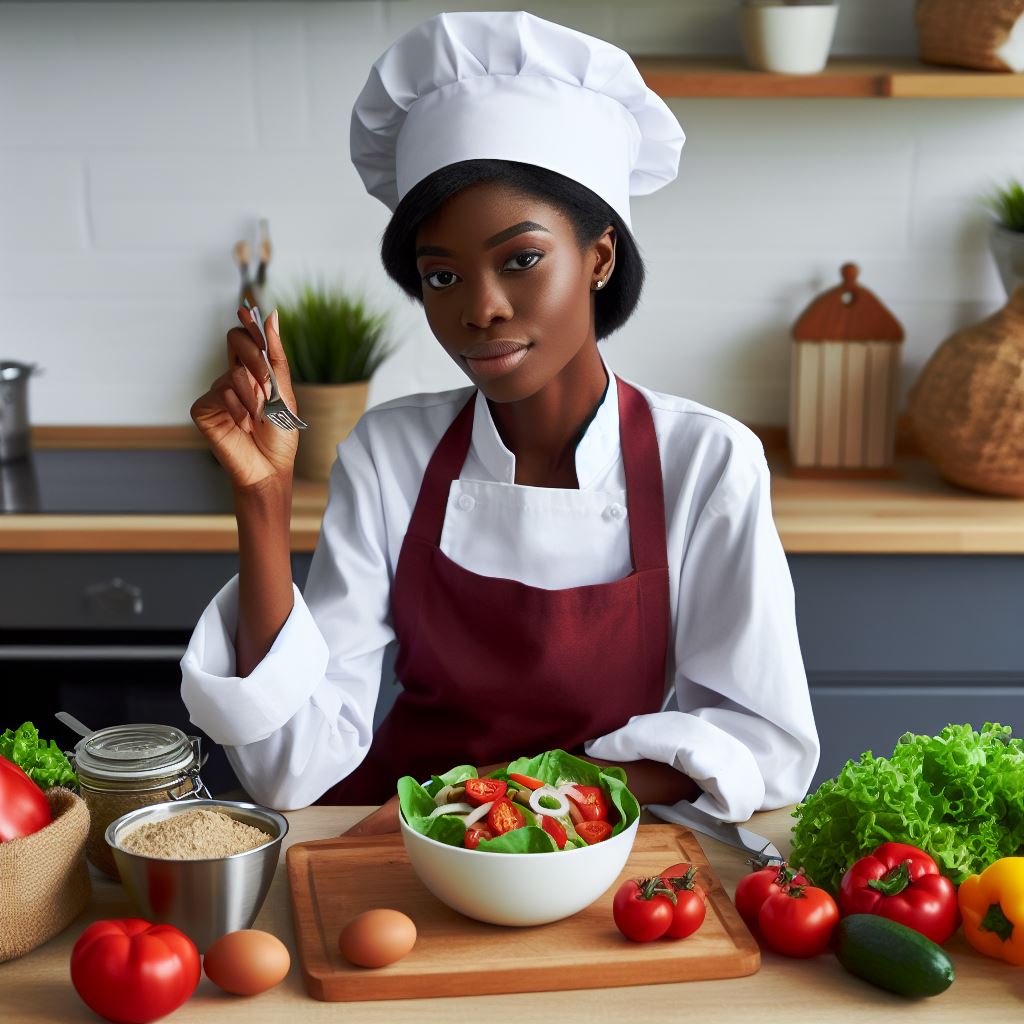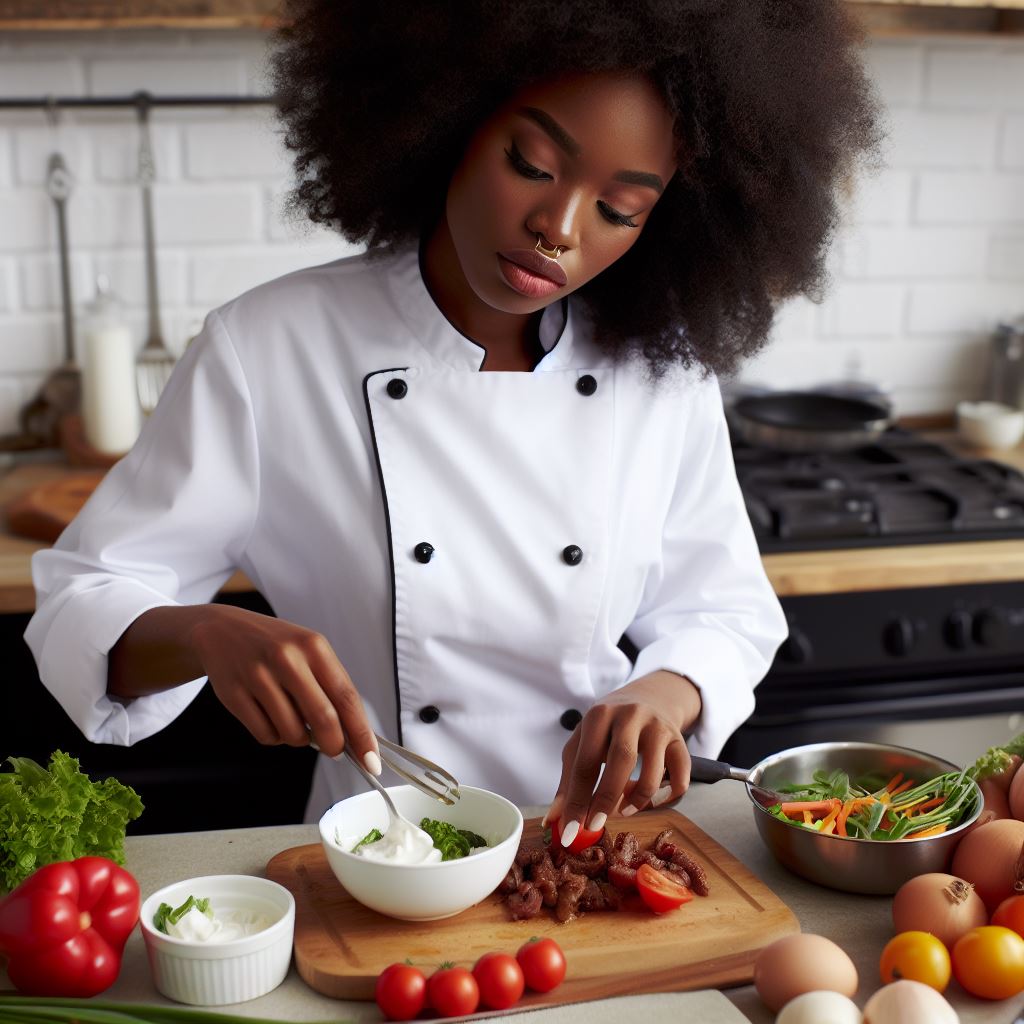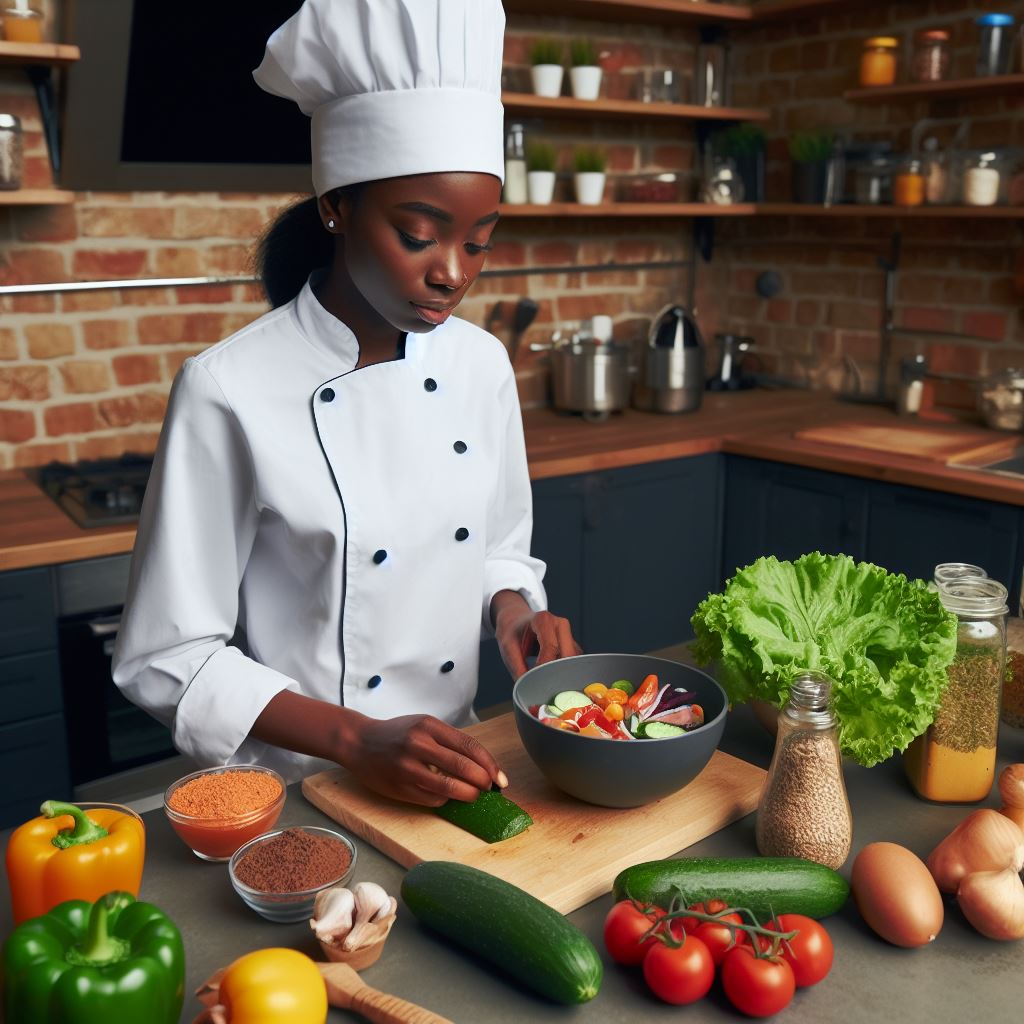Introduction
A balanced diet is crucial for overall health as it provides essential nutrients.
The Importance of a Balanced Diet for Overall Health
A balanced diet provides the body with the essential nutrients it needs to function properly and maintain overall health.
A healthy diet includes a variety of foods from all food groups, including fruits, vegetables, grains, protein, and dairy.
The Role of Iron in the Body
Iron is a vital mineral that plays a crucial role in carrying oxygen throughout the body.
Oxygen is essential for energy production, cell growth, and overall health. Iron deficiency can lead to fatigue, weakness, and other health problems.
Food Sources of Iron in Nigeria
Nigeria is home to a variety of iron-rich foods that can help you meet your daily iron needs. Some of the best sources of iron in Nigeria include:
- Red meat: Beef, pork, and lamb are all good sources of iron.
- Poultry: Chicken and turkey are also good sources of iron.
- Fish: Fish, especially sardines and mackerel, are excellent sources of iron.
- Beans: Beans, lentils, and peas are all good sources of iron.
- Dark leafy greens: Spinach, kale, and collard greens are all excellent sources of iron.
- Fortified foods: Many foods in Nigeria are fortified with iron, such as breakfast cereals, bread, and flour.
By including a variety of iron-rich foods in your diet, you can help to boost your iron levels and improve your overall health.
Understanding Iron and Its Benefits
What iron is and its role in the body
Iron is an essential mineral that plays a crucial role in the body’s overall functioning.
It is responsible for carrying oxygen to every part of the body through red blood cells.
Without sufficient iron levels, the body cannot produce enough healthy red blood cells, leading to iron deficiency anemia.
Importance of maintaining adequate iron levels for overall health
Maintaining adequate iron levels is vital for overall health and wellbeing.
Iron deficiency can cause fatigue, weakness, impaired cognitive function, and a compromised immune system.
It is especially crucial for children, adolescents, pregnant women, and athletes to ensure they consume enough iron-rich foods.
The benefits of consuming iron-rich foods
Consuming iron-rich foods not only helps prevent iron deficiency anemia but also offers several significant health benefits. These include:
- Improved Energy Levels: Iron is essential for the production of energy in the body. Adequate iron levels contribute to increased energy levels and overall vitality.
- Enhanced Cognitive Function: Iron plays a vital role in ensuring proper brain function. It aids in the development and maintenance of cognitive abilities, including memory, concentration, and alertness.
- Strengthened Immune System: Iron is necessary for an optimal immune response. It supports the production of white blood cells, which are crucial for fighting off infections and diseases.
- Healthy Pregnancy: During pregnancy, iron requirements increase to support the growing fetus. Consuming iron-rich foods helps prevent iron deficiency anemia in pregnant women and promotes the healthy development of the baby.
- Increased Athletic Performance: Adequate iron levels are crucial for athletes and physically active individuals. Iron contributes to oxygen transport, allowing muscles to perform optimally and aiding in post-exercise recovery.
To boost your iron intake, incorporate these iron-rich foods into your diet:
Unlock the Power of Nigerian Food Minerals
Discover personalized Food Advisory tailored to boost your health or business using expert insights on Nigerian minerals.
Get Started- Red Meat: Beef, lamb, and pork are excellent sources of heme iron, which is easily absorbed by the body.
- Poultry and Seafood: Chicken, turkey, fish, and shellfish also provide good amounts of easily absorbable iron.
- Legumes: Beans, lentils, chickpeas, and soybeans are rich in iron, and they are also high in fiber and protein.
- Dark Leafy Greens: Spinach, kale, and Swiss chard are packed with iron, along with other essential vitamins and minerals.
- Nuts and Seeds: Cashews, almonds, pumpkin seeds, and sesame seeds are not only a good source of iron but also provide healthy fats.
- Fortified Cereals and Grains: Many breakfast cereals and grains are fortified with iron, making them an easy way to increase your iron intake.
- Dried Fruits: Raisins, prunes, apricots, and figs are all iron-rich dried fruits that can be enjoyed as a snack or added to dishes.
Remember, to enhance iron absorption, pair iron-rich foods with a source of vitamin C.
Citrus fruits, bell peppers, tomatoes, and strawberries are excellent choices.
In fact, understanding the importance of iron and its benefits to overall health is crucial.
Incorporating iron-rich foods into your diet can help maintain adequate iron levels and promote optimum health and wellbeing.
Speak to a healthcare professional for personalized dietary recommendations and to address any concerns regarding iron in your diet.
Read: Essential Minerals Found in Nigerian Local Dishes
Iron Deficiency in Nigeria
Iron deficiency is a widespread problem in Nigeria, affecting both children and adults.
Prevalence of Iron Deficiency
- A large percentage of the population in Nigeria, particularly women and children, suffer from iron deficiency.
- A national survey revealed that over 60% of children under the age of five and 40% of women are anemic.
Causes and Symptoms
- The main cause of iron deficiency in Nigeria is the lack of access to iron-rich foods.
- Poor dietary choices, including a high intake of processed and refined foods, contribute to the problem.
- The symptoms of iron deficiency include fatigue, weakness, pale skin, and shortness of breath.
Consequences and Health Risks
- Iron deficiency can lead to severe health consequences if left untreated.
- Children with iron deficiency may experience developmental delays, learning difficulties, and decreased immune function.
- Iron deficiency anemia during pregnancy increases the risk of maternal and infant mortality.
Iron-Rich Foods in Nigeria
Fortunately, there are several iron-rich foods available in Nigeria that can help combat iron deficiency.
Red Meat
Beef, lamb, and goat meat are excellent sources of heme iron, the most easily absorbed form of iron.
Organ Meats
Liver, heart, and kidneys are highly concentrated in iron and can provide significant amounts of this essential nutrient.
Dark Leafy Greens
Vegetables such as spinach, kale, and collard greens are packed with iron and other vital nutrients.
Legumes
Beans, lentils, and chickpeas are affordable plant-based sources of iron, especially for vegetarians and vegans.
Palm Fruit
Palm fruit, commonly used in Nigerian cuisine, contains iron and other micronutrients.
Fish and Seafood
Fish, particularly oily fish like mackerel and sardines, provides both heme and non-heme iron.
Captivate Your Audience with Exclusive Nigerian Food Content
Imagine your platform enriched with unique, mineral-rich Nigerian cuisine stories that no one else can offer. Let's create content that resonates deeply and sets you apart.
Get StartedNuts and Seeds
Almonds, cashews, pumpkin seeds, and sesame seeds are nutritious snacks that can boost iron levels.
Traditional Nigerian Dishes
Various local dishes like egusi soup, banga soup, and okra soup incorporate iron-rich ingredients.
Taking Action for Better Health
To combat iron deficiency, educating the population about the importance of a balanced diet is crucial.
Efforts should be made to promote the consumption of iron-rich foods to improve overall health and well-being.
Iron deficiency is a significant health concern in Nigeria with far-reaching consequences.
By incorporating iron-rich foods into daily meals, individuals can take proactive steps to boost their health and prevent iron deficiency.
Read: The Intersection of Minerals, Health, and Nigerian Foods

Top Iron-Rich Foods in Nigeria
Iron is an essential mineral needed by the body for proper growth and development. It helps in the production of red blood cells, which transport oxygen throughout the body.
Iron deficiency can lead to anemia, fatigue, and weakened immune system.
To ensure optimal health, it is important to consume iron-rich foods regularly.
In Nigeria, there are several iron-rich foods that are commonly consumed.
List of the top iron-rich foods commonly found in Nigeria
Here is a list of the top iron-rich foods found in Nigeria:
- Spinach: Spinach is a leafy green vegetable that is packed with iron. It is also a good source of vitamin C, which helps in the absorption of iron by the body.
- Red meat: Red meat, such as beef and lamb, is highly rich in iron. It is a great source of heme iron, which is easily absorbed by the body.
- Liver: Liver, especially beef and chicken liver, is one of the richest sources of iron. It is also loaded with other essential nutrients like vitamin A, B vitamins, and zinc.
- Pumpkin seeds: Pumpkin seeds are not only a delicious snack but also a good source of iron. They are also high in other minerals like magnesium and zinc.
- Beans: Beans, such as black-eyed peas and lentils, are rich in iron and fiber. They are a staple in many traditional Nigerian dishes and provide a good amount of protein as well.
- Dried fruits: Dried fruits like dates, raisins, and apricots are excellent sources of iron. They make for a convenient and nutritious snack, especially when on the go.
- Groundnuts: Groundnuts, also known as peanuts, are a delicious and iron-rich food. They are also high in protein and healthy fats.
Traditional Nigerian dishes and ingredients rich in iron
- Bitter leaf: Bitter leaf is a common ingredient in Nigerian cuisine and is known for its health benefits. It is a good source of iron and other essential nutrients.
- Egusi soup: Egusi soup is a traditional Nigerian dish made from melon seeds. It is not only delicious but also provides a good amount of iron.
- Ogbono soup: Ogbono soup is another popular Nigerian soup that is rich in iron. It is made from ground ogbono seeds and is often combined with meat or fish.
The nutritional value and iron content of each food
Each of these iron-rich foods provides various nutritional benefits and contains a significant amount of iron.
Spinach, for example, is not only rich in iron but also contains folate, vitamin K, and fiber.
Red meat is not only a good source of iron but also provides high-quality protein and essential amino acids.
Liver, besides being rich in iron, is also an excellent source of vitamin A, which is crucial for eye health.
Including these iron-rich foods in your diet can help prevent iron deficiency and boost your overall health.
It is important to note that while these foods are rich in iron, the body’s ability to absorb iron can vary.
Pairing iron-rich foods with vitamin C-rich foods can enhance iron absorption.
Avoiding consuming iron-rich foods with foods that inhibit iron absorption, such as tea or coffee, can also ensure optimal iron levels in the body.
Basically, consuming iron-rich foods is essential for maintaining good health.
Including foods like spinach, red meat, liver, and pumpkin seeds in your diet can help prevent iron deficiency and promote overall well-being.
Incorporating traditional Nigerian dishes such as egusi soup and bitter leaf into your meals can also provide a good amount of iron.
Remember to combine iron-rich foods with vitamin C-rich foods for better absorption and be mindful of foods that can hinder iron absorption.
By incorporating these delicious and nutritious iron-rich foods into your diet, you can give your health a significant boost.
Read: Food Processing in Nigeria: Preserving Mineral Value
Incorporating Iron-Rich Foods into Daily Diet
Iron is an essential mineral that plays a crucial role in the body.
It is responsible for carrying oxygen to the cells and supporting overall health.
Iron deficiency is a common problem in Nigeria, affecting a significant portion of the population.
Incorporating iron-rich foods into your daily diet can help boost your iron levels and improve your overall health.
Tips and Suggestions for Including More Iron-Rich Foods in Your Daily Meals
- Include foods high in heme iron, such as lean meats, poultry, and fish, in your diet.
- Add plant-based iron sources like beans, lentils, and tofu to your meals.
- Include dark leafy greens like spinach and kale, which are excellent sources of iron.
- Incorporate iron-fortified cereals and grains into your breakfast routine.
- Snack on nuts and seeds, such as almonds and pumpkin seeds, as they are good sources of iron.
- Combine iron-rich foods with sources of vitamin C, such as citrus fruits, to enhance iron absorption.
- Use cast-iron cookware while preparing your meals, as it can increase the iron content.
- Try incorporating liver into your diet, as it is one of the richest sources of iron.
Examples of Meal Plans That Incorporate Iron-Rich Foods
Day 1
- Breakfast: Iron-fortified oatmeal topped with strawberries and a handful of almonds.
- Lunch: Grilled chicken breast with a side of steamed broccoli and brown rice.
- Snack: Apple slices with peanut butter.
- Dinner: Baked salmon accompanied by a spinach salad.
Day 2
- Breakfast: Scrambled eggs with sautéed spinach and whole wheat toast.
- Lunch: Chickpea salad with tomatoes, cucumbers, and feta cheese.
- Snack: Trail mix containing dried fruits and mixed nuts.
- Dinner: Beef stir-fry with bell peppers and brown rice.
The Importance of Balance and Variety in a Healthy Diet
While incorporating iron-rich foods into your diet is crucial, it is equally important to emphasize balance and variety in your overall eating plan.
A healthy diet should include a variety of foods from different food groups to ensure you receive all the necessary nutrients.
When planning your meals, aim to include fruits, vegetables, whole grains, lean proteins, and healthy fats.
This variety will not only provide different nutrients but also help avoid monotony in your meals.
Additionally, incorporating different cooking methods, such as grilling, steaming, and baking, can add diversity to your dishes.
Moreover, maintaining a balance between the different nutrients is essential. A diet rich in iron but lacking in other essential nutrients will not provide optimal health benefits.
Therefore, it is crucial to include a mix of macronutrients like carbohydrates, proteins, and fats in your meals.
Therefore, incorporating iron-rich foods into your daily diet is essential to boost your iron levels and promote overall health.
By following the tips and examples provided above, you can easily add more iron to your meals.
However, don’t forget to emphasize balance and variety in your diet to ensure you are getting all the necessary nutrients for a healthy body.
Read: Mineral-Rich Nigerian Recipes for Every Meal
Factors That Enhance or Inhibit Iron Absorption
When it comes to boosting your health, incorporating iron-rich foods into your diet is essential.
However, there are several other factors to consider for optimal iron absorption.
- Calcium: Consuming calcium-rich foods along with iron-rich foods can inhibit iron absorption. Avoid pairing these two nutrients.
- Caffeine: Drinking caffeinated beverages, such as coffee or tea, can hinder iron absorption. Consume them separately from iron-rich meals.
- Phytates: Foods like legumes, whole grains, and seeds contain phytates, which can bind to iron and lower its absorption. Soaking or fermenting these foods can reduce their phytate content.
- Oxalates: Spinach, rhubarb, and beet greens contain oxalates that can bind to iron. Cooking these vegetables can reduce the oxalate levels and increase iron absorption.
- Phenolic compounds: Certain fruits, vegetables, and beverages (like red wine and black tea) contain phenolic compounds that inhibit iron absorption.
Tips for Maximizing Iron Absorption
- Pair iron-rich foods with vitamin C sources: Consuming foods rich in vitamin C alongside iron-rich foods can significantly enhance iron absorption. Opt for citrus fruits, berries, tomatoes, or bell peppers.
- Avoid consuming calcium-rich foods or beverages during iron-rich meals: Calcium can interfere with iron absorption, so it’s best to separate them.
- Combine plant-based and animal-based iron sources: Plant-based sources of iron are not as easily absorbed by the body as animal-based sources. Pairing these sources can optimize absorption.
- Include foods high in heme iron: Heme iron, found in animal products like red meat and liver, is highly bioavailable. Incorporate them into your diet for better iron absorption.
The Importance of Pairing Iron-Rich Foods with Vitamin C Sources
Vitamin C plays a crucial role in iron absorption. It promotes the conversion of non-heme iron (found in plant-based foods) to a form that the body can readily absorb.
It is essential to pair iron-rich foods with vitamin C sources for maximum benefit.
When planning meals, consider combining iron-rich plant-based foods like lentils, beans, or leafy greens with vitamin C-rich foods like citrus fruits, strawberries, or peppers.
This combination will aid in enhancing iron absorption and help meet your daily iron requirements.
Most importantly, while consuming iron-rich foods is important for your health, it is equally vital to consider other factors that affect iron absorption.
Avoid pairing iron-rich foods with calcium-rich foods or beverages, as well as consuming caffeine with iron-rich meals.
Be mindful of phytates, oxalates, and phenolic compounds that can inhibit iron absorption.
Conversely, maximize your iron absorption by pairing iron-rich foods with vitamin C sources and combining plant-based and animal-based iron sources.
By implementing these tips, you can ensure that your body benefits from the iron you consume.
Conclusion
Iron plays a crucial role in maintaining overall health. Its deficiency can lead to various health issues, such as anemia and fatigue.
It is essential to incorporate iron-rich foods into our diet.
By adding foods like spinach, beans, liver, and fortified cereals into our meals, we can ensure a sufficient intake of iron.
These foods are not only tasty but also provide the necessary nutrients for our well-being.
Boosting our health is within our reach by consuming more iron-rich foods. Let’s prioritize our well-being and make conscious choices that benefit our bodies.
Remember, a healthy diet leads to a healthy life. Start incorporating iron-rich foods into your diet today!




